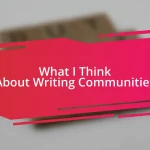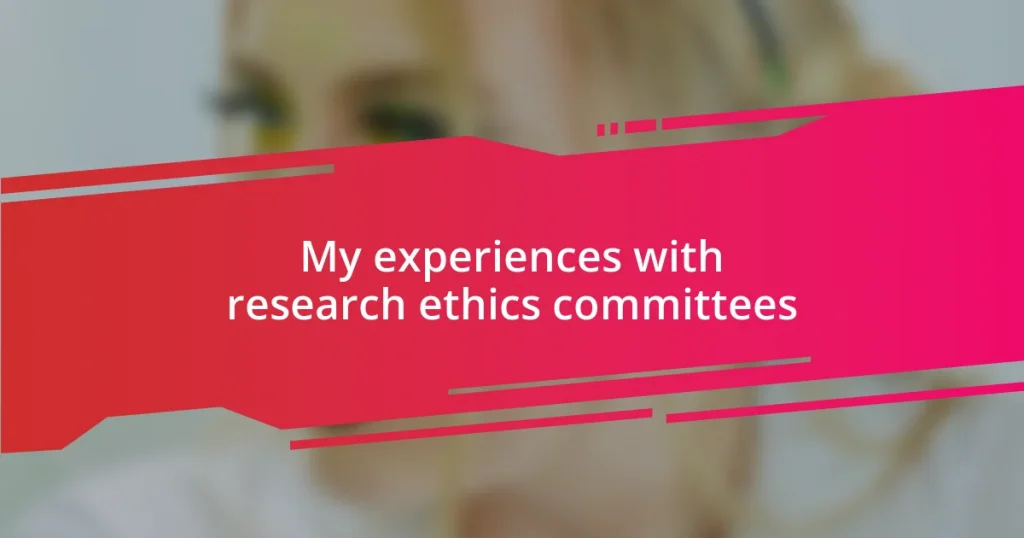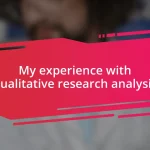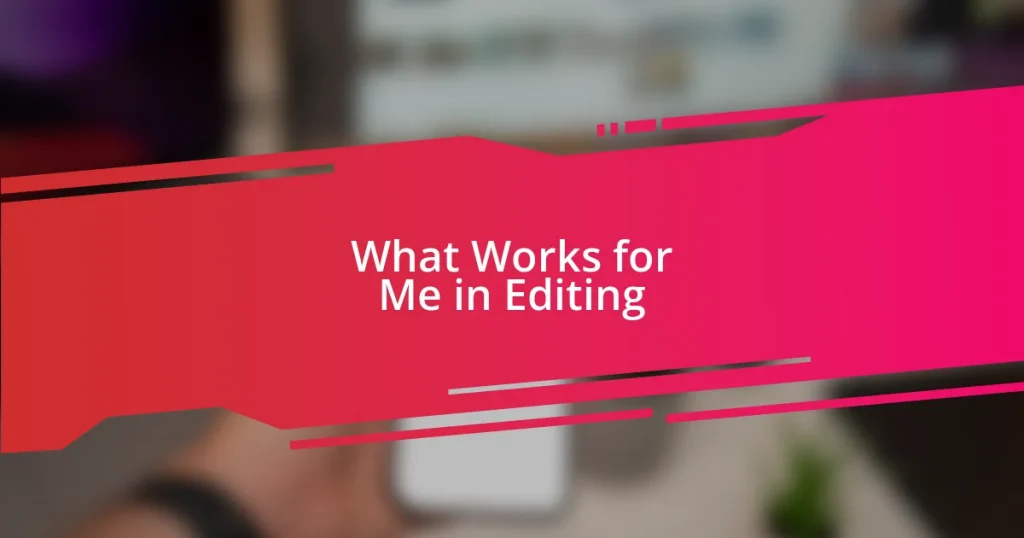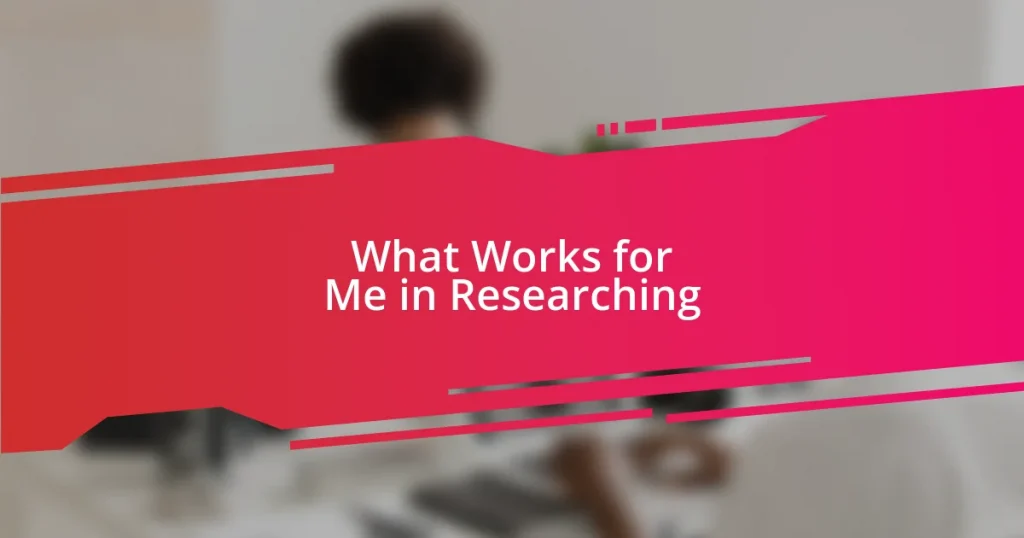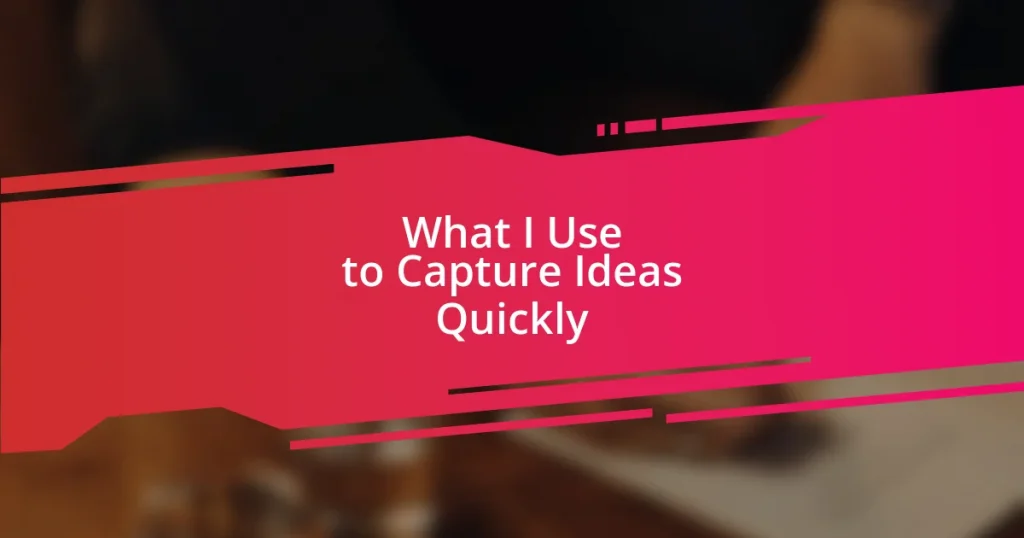Key takeaways:
- The commitment of research ethics committees is driven by a deep belief in protecting participant welfare and human dignity, emphasizing the moral responsibility they carry.
- Effective communication strategies, such as transparency, active listening, and using visuals, foster collaboration and enhance the review process with ethics committees.
- Patience, adaptability, and a mindset shift from viewing the committee as gatekeepers to collaborators are crucial for navigating ethical challenges in research.
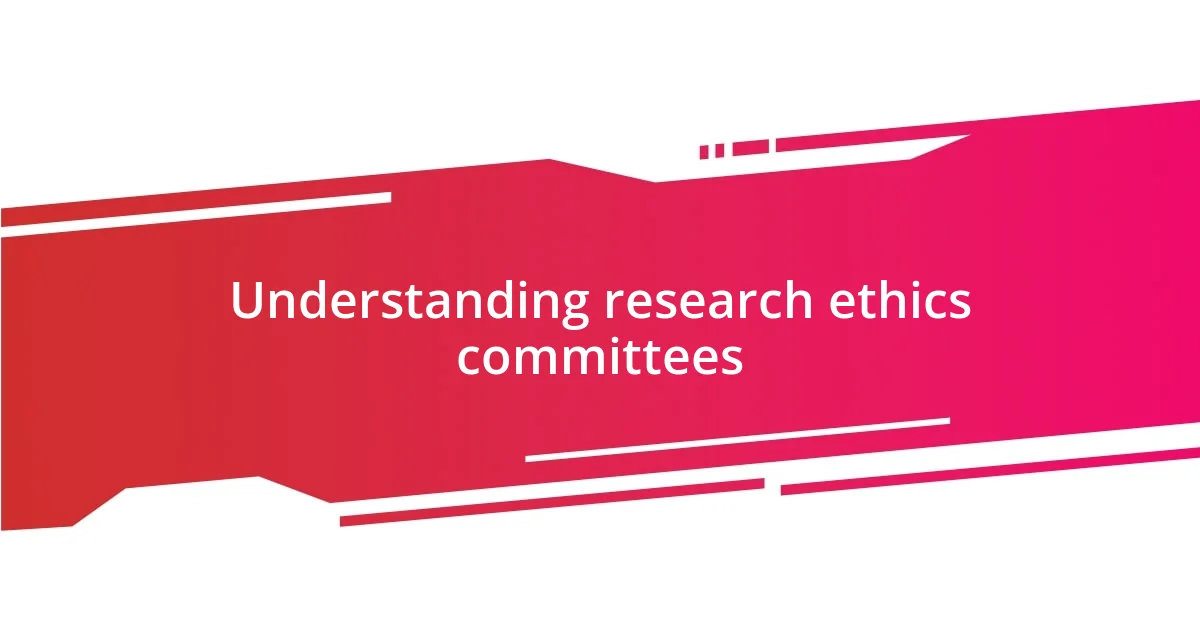
Understanding research ethics committees
When I first encountered research ethics committees, I was struck by their pivotal role in safeguarding participant welfare. The deliberations often felt intense, as members scrutinized proposals to ensure that ethical standards weren’t just met but genuinely upheld. Have you ever wondered what drives the fierce dedication of these committees? For me, it became evident that their commitment stems from a deep-seated belief in the sanctity of human dignity.
In my interactions with ethics committees, I noticed a blend of professionalism and compassion. I remember one meeting where a committee member passionately advocated for vulnerable populations, reminding us that our research could have real-world consequences on their lives. This experience made me appreciate the emotional weight and moral responsibility that committee members carry, which often goes unnoticed.
As I sought to navigate the complexities of ethical approvals, I found myself questioning the balance between advancing knowledge and respecting individual rights. The process can feel daunting – have I truly considered all ethical implications? Yet, with every step, I gained clarity and confidence, realizing that these committees serve as essential guardians of ethical integrity in research.
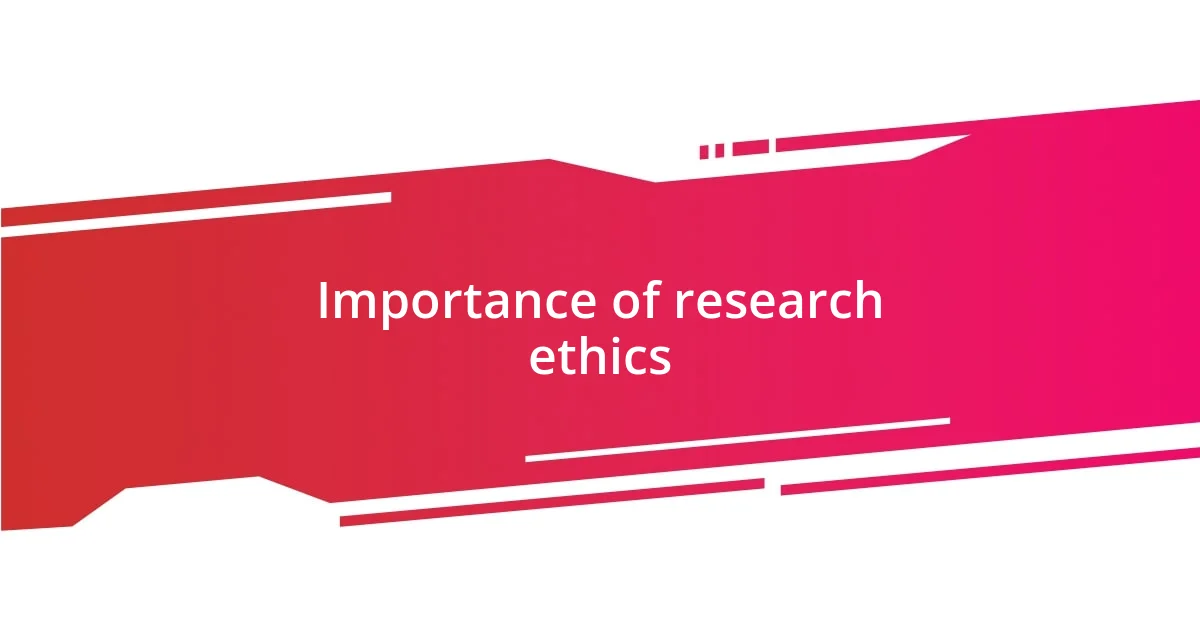
Importance of research ethics
The importance of research ethics cannot be overstated. It serves as a cornerstone for responsible research practices. I vividly recall a study proposal I submitted that involved sensitive data collection from participants. The ethics committee raised critical concerns about confidentiality that I hadn’t even considered at first. This experience illuminated for me how ethical guidelines not only protect participants but also guide researchers in conducting responsible and respectful studies.
Consider the following key aspects of research ethics:
- Protection of Participants: Ensures that the rights and welfare of participants are prioritized throughout the research process.
- Integrity of Research: Maintains the credibility and reliability of the findings by promoting transparency and objectivity.
- Building Trust: Establishes a foundation of trust between researchers and the community, crucial for participant recruitment and data validity.
- Avoiding Harm: Helps to prevent any potential harm or exploitation of vulnerable populations, ensuring equitable treatment in the research setting.
- Compliance with Regulations: Adheres to legal and institutional guidelines that govern research practices, which helps avoid legal complications.
Each of these points resonates with my own experiences, reinforcing the essential role that research ethics plays in nurturing a respectful and responsible research environment.
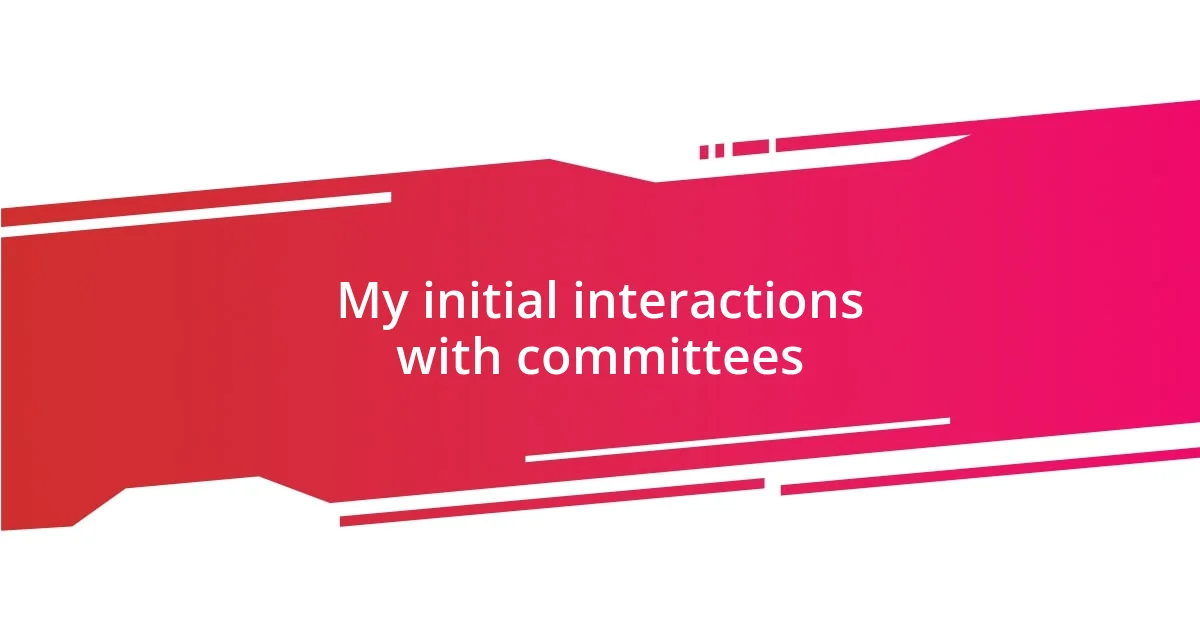
My initial interactions with committees
In my early interactions with research ethics committees, I felt a mix of nervousness and curiosity. I vividly remember my first presentation, where I laid out my research proposal. It was intimidating to see a room full of thoughtful experts scrutinizing my work. However, I quickly realized that their probing questions came from a place of genuine concern, aimed at protecting the individuals involved in my study. This made me appreciate their role even more, recognizing that their focus wasn’t just on compliance but on the broader impact of our work.
During another meeting, I was struck by the heartfelt stories shared by committee members about past experiences with unethical research practices. One member recounted how mismanagement led to significant harm to participants in a previous study. That personal insight underscored the emotional weight carried by these committees and the profound responsibility they undertake. It wasn’t merely about following rules; it was about preventing history from repeating itself. This moment was transformative for me, reinforcing the importance of ethics in research beyond the procedural aspects.
As I continued engaging with the committees, I began to see them as partners rather than gatekeepers. By discussing challenges and seeking their advice, I fostered a more collaborative atmosphere. I recall feeling an overwhelming sense of relief when they supported my initiative to conduct a pilot study that addressed previously highlighted ethical concerns. It was a turning point; I realized that these committees genuinely wanted to help researchers navigate the ethical landscape while maintaining integrity and respect for participants.
| Aspect | My Experience |
|---|---|
| Nervousness during the first presentation | Felt intimidated but recognized the committee’s genuine concern for participant welfare. |
| Emotional stories from committee members | Realized the depth of responsibility they carry, rooted in preventing harm from past unethical practices. |
| Shift from gatekeeping to collaboration | Found strong support from the committee in developing ethical research initiatives. |
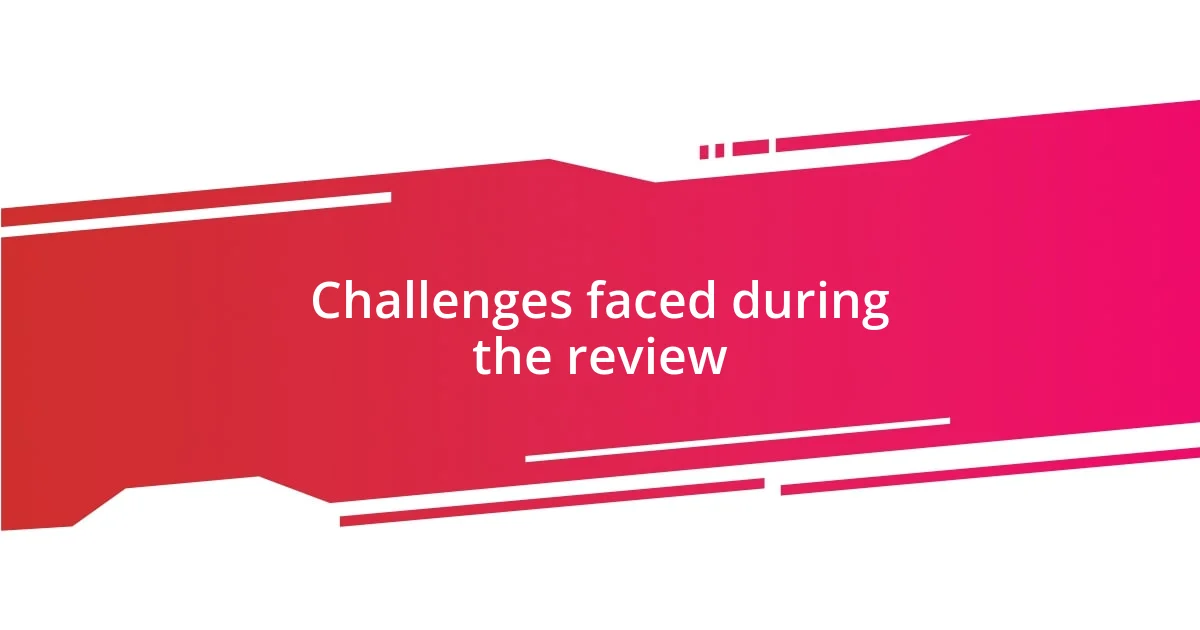
Challenges faced during the review
The review process often brings unexpected challenges. One particular instance that stands out to me was when I submitted a proposal for a longitudinal study. The ethics committee questioned my justification for the selected duration and frequency of participant follow-ups. I initially felt defensive, but it made me reconsider how the time commitment might impact participants’ willingness to engage. This moment reminded me how vital it is to thoroughly evaluate every aspect of my research design from the participant’s perspective.
Another significant challenge was navigating the differing opinions within the committee. During one review, there was a heated debate about the potential risks involved in recruiting participants with mental health issues. I watched as committee members passionately articulated their perspectives. It struck me how these discussions not only reflect academic rigor but also showcase the emotional investment of each member. I really had to listen and adapt my proposal to address their concerns rather than simply ticking regulatory boxes.
Sometimes, the timeline for a review feels painfully slow, especially when you’re eager to start your research. I remember waiting for weeks for feedback on a study assessing a new intervention for chronic illness. It was daunting to think about how many potential participants might lose access to help during that time. This experience taught me patience and reinforced the idea that these thorough evaluations are ultimately for the greater good, helping to ensure the ethical integrity of research practices.
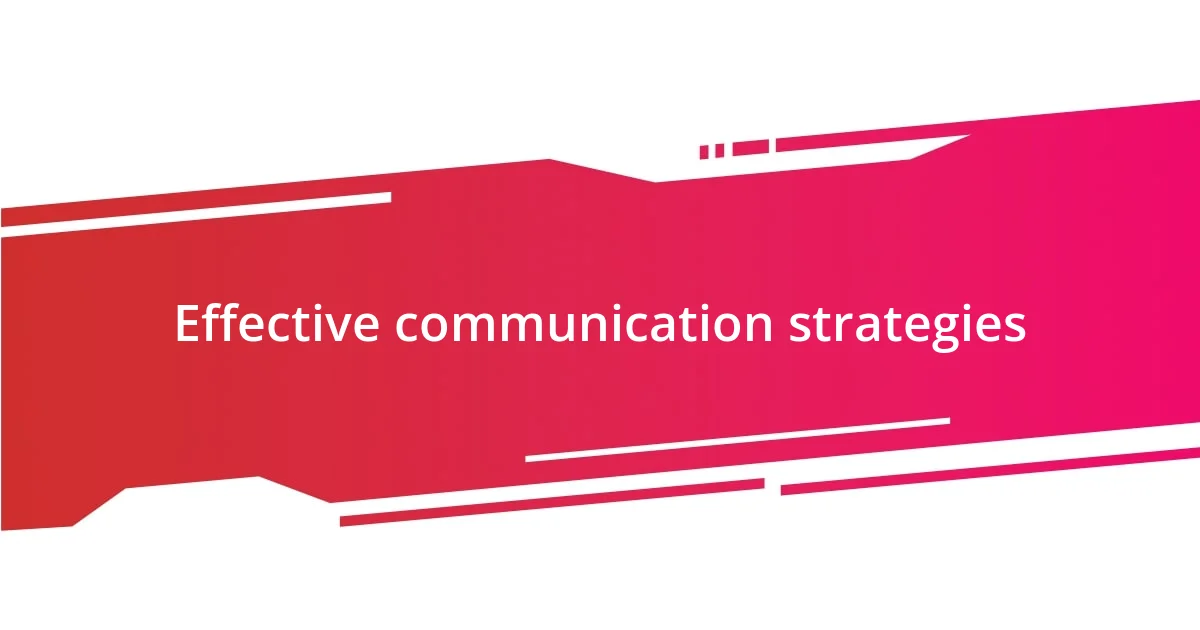
Effective communication strategies
Effective communication with research ethics committees often starts with transparency. I remember a time when I was preparing a new project proposal. I decided to send an email in advance, outlining my objectives and the ethical considerations I was addressing. This approach not only set a positive tone for our upcoming discussion but also cultivated an environment of trust, showing that I valued their insights. Isn’t it amazing how a simple gesture can turn a formal interaction into a more fluid conversation?
Another strategy I’ve found beneficial is active listening. There was an instance where committee members voiced concerns about potential biases in my study design. Instead of feeling defensive, I made a conscious effort to listen intently and ask clarifying questions. By doing so, I discovered that their insights were rooted in legitimate apprehensions that I hadn’t fully considered. This moment transformed the dynamic; instead of seeing the committee as an obstacle, I recognized them as invaluable partners in refining my research.
Lastly, using visuals can be a game changer. During a particularly complex project, I created a visual roadmap of my research phases and ethical checkpoints. Presenting this to the committee made it easier for them to grasp the flow and rationale behind my decisions. I saw the shift in their expressions—from puzzled to engaged. This taught me that when we cater to different communication styles, we open the door for richer dialogues. How often do we undervalue the power of visuals in conveying intricate ideas?
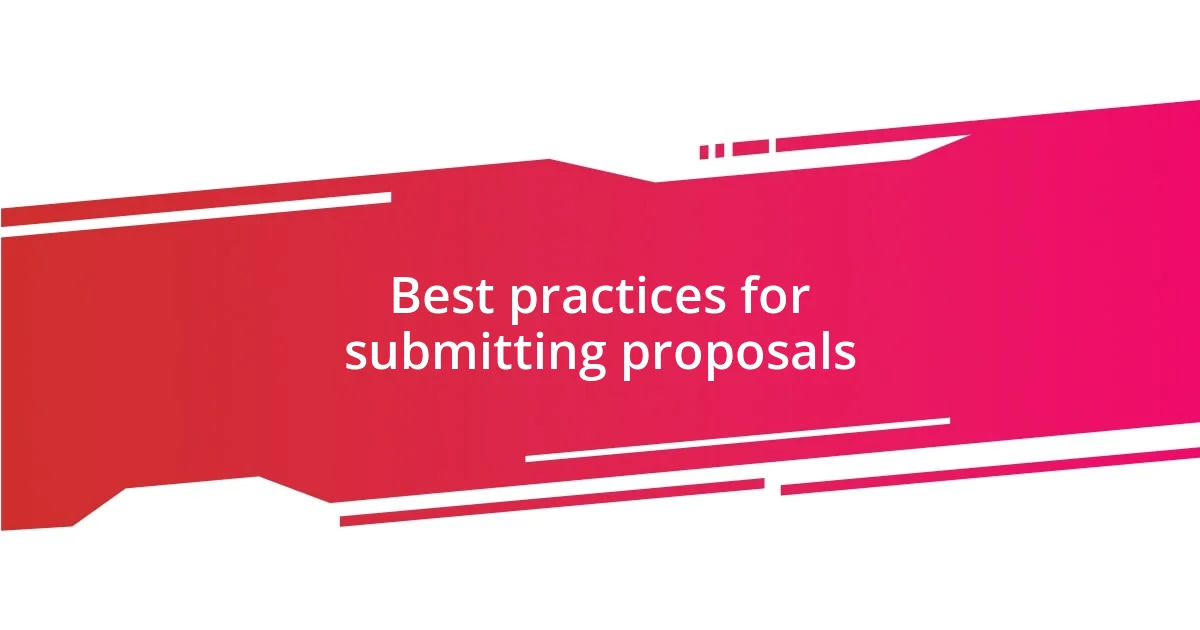
Best practices for submitting proposals
When it comes to submitting proposals, clarity is key. In my experience, I’ve learned that being straightforward about your methodology can make all the difference. For instance, when I submitted a proposal that included a complex statistical analysis, I made sure to outline each step clearly. This not only helped the committee understand my plan but also preempted potential questions about my approach. Have you ever considered how a little transparency can streamline the entire review process?
Thorough documentation of all ethical considerations is another best practice I swear by. During a proposal for a sensitive qualitative study, I meticulously included details about consent processes and participant support. This level of detail not only demonstrated my commitment to ethical research but also instilled confidence in the committee about my readiness to handle the challenges of the project. It’s a bit like showing your homework; it reassures everyone that you’ve thought it all through.
Lastly, engaging with the feedback I received was invaluable. After one submission, I took the time to reflect on the committee’s comments, integrating their suggestions into a revised proposal. This approach didn’t just improve my chances of approval; it fostered a collaborative spirit that I truly valued. By embracing constructive criticism instead of viewing it as a setback, I learned that these interactions can be powerful learning experiences. Have you ever viewed feedback as a step towards refining your vision? I know I have, and it’s made me a better researcher.
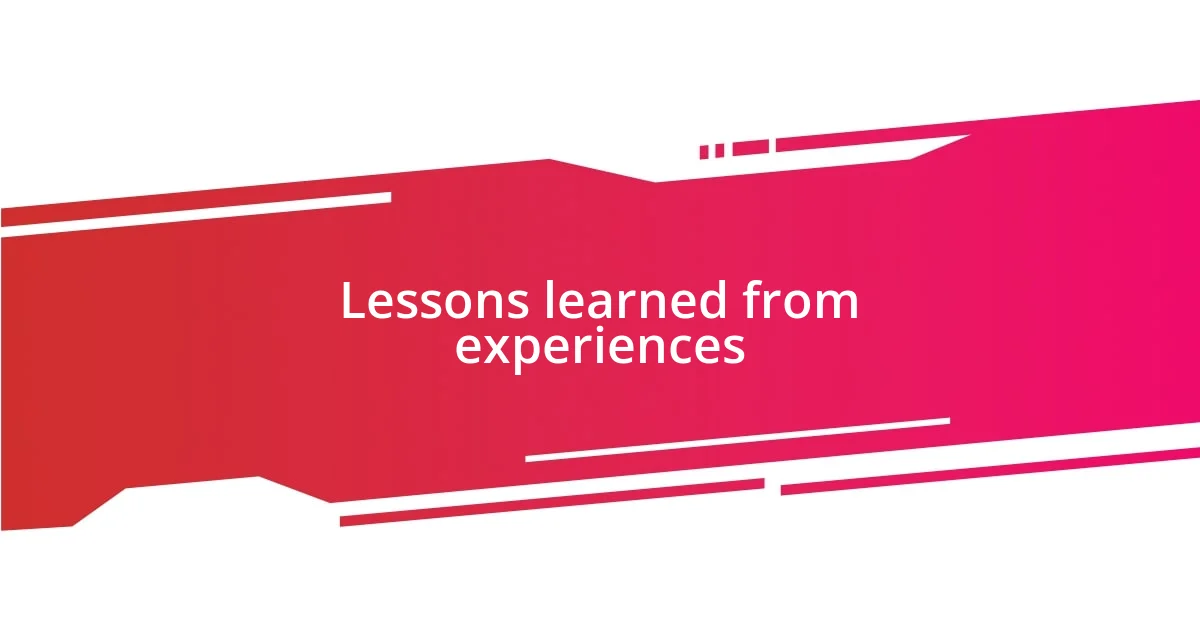
Lessons learned from experiences
One important lesson I’ve learned is the significance of patience in the review process. I recall a proposal that was under scrutiny for what felt like an eternity. Initially, I found myself frustrated and anxious, questioning whether my research would ever move forward. However, that experience taught me the value of allowing the committee the time they needed to deeply engage with my work. Navigating the ethical waters of research is complex, and patience can be a vital ingredient in receiving thorough and thoughtful feedback.
Another realization I’ve had is the importance of adapting my perspective. Early on, I viewed each interaction with the ethics committee as a hurdle. After a particularly enlightening discussion regarding participant anonymization protocols, I began to see the committee not as gatekeepers, but as co-creators of my research’s integrity. This shift in mindset not only eased my anxiety but also enriched the quality of my proposals, reinforcing that collaboration makes for better science. Have you ever experienced a moment that shifted your entire perspective on a project?
Finally, maintaining flexibility has proven invaluable. There was a moment when my initial research design was met with skepticism due to ethical implications I hadn’t fully addressed. Initially, I was resistant to change; however, by considering alternative approaches the committee suggested, I discovered a new dimension to my project that I hadn’t considered before. It was a little uncomfortable at first, but I learned that sometimes, embracing flexibility leads to innovations we cannot see from our original vantage point. Isn’t it fascinating how adaptability can breathe new life into our research endeavors?








